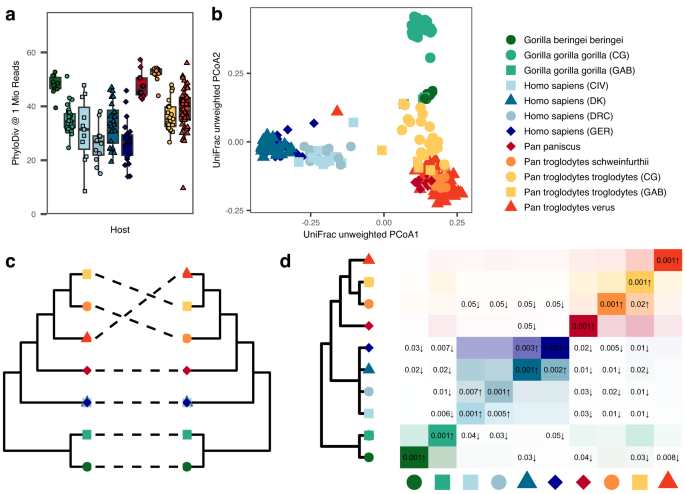💡 The study aimed to unravel the intricate evolutionary trajectories of the human gut microbiome in comparison to our closest relatives, the African great apes, shedding light on taxonomic and functional changes over millions of years.
📍 Methodology: Over 200 fecal samples from diverse human populations, wild-living chimpanzees, bonobos, and gorillas were subjected to high-resolution metagenomic analyses. The dataset included microbial genomes reconstructed from wild non-human apes and human populations from Africa and Europe.
📍 Key Findings:
📌 Host-Specific Microbiota Patterns: Human-associated taxa were found depleted in non-human apes, indicating the acquisition of novel microbial clades during host evolution. Host-specific gut microbiota patterns were identified, suggesting distinct evolutionary trajectories.
📌 Loss of Diversity in Human Populations: Pervasive loss of microbial diversity was observed in human populations with a high Human Development Index. Evolutionarily conserved microbial clades exhibited depletion in correlation with industrialization and lifestyle changes.
📌 Functional Adaptations and Aerobic Respiration: European populations showed enrichment in functional traits related to aerobic respiration, suggesting adaptation to high oxygen concentrations. Introduction of novel microbes associated with industrialization altered the community composition of fecal microbiota in European populations.
📌 𝘗𝘳𝘦𝘷𝘰𝘵𝘦𝘭𝘭𝘢 Dynamics and Enterotype Evolution: 𝘗𝘳𝘦𝘷𝘰𝘵𝘦𝘭𝘭𝘢, a key taxon in human enterotypes, displayed reduced abundance in European populations but was conserved across hominids. 𝘗𝘳𝘦𝘷𝘰𝘵𝘦𝘭𝘭𝘢 depletion in Western populations may signify departure from an evolutionary ancestral gut microbiome state.
📌 Co-Phylogeny Patterns: Co-phylogeny analysis revealed clade-specific enrichments and depletions, with human-derived microbial genomes less prevalent in co-phylogenetic groups. Reduced genome sizes, gene counts, and specific functional traits were observed, indicating microbial specialization in hominid guts.
📍This comprehensive evolutionary analysis provides crucial insights into the human gut microbiome’s development, emphasizing the impact of lifestyle changes on microbial diversity and functionality. The study lays the groundwork for understanding microbiome-associated inflammatory disorders and informs personalized interventions for improved human health.
Link to the article : http://tinyurl.com/4zj7az6s
